Related Research Articles

Edgar Allan Poe was an American writer, poet, author, editor, and literary critic who is best known for his poetry and short stories, particularly his tales of mystery and the macabre. He is widely regarded as a central figure of Romanticism and Gothic fiction in the United States, and of American literature. Poe was one of the country's earliest practitioners of the short story, and is considered the inventor of the detective fiction genre, as well as a significant contributor to the emerging genre of science fiction. He is the first well-known American writer to earn a living through writing alone, resulting in a financially difficult life and career.

"The Black Cat" is a short story by American writer Edgar Allan Poe. It was first published in the August 19, 1843, edition of The Saturday Evening Post. In the story, an unnamed narrator has a strong affection for pets until he perversely turns to abusing them. His favorite, a pet black cat, bites him one night and the narrator punishes it by cutting its eye out and then hanging it from a tree. The home burns down but one remaining wall shows a burned outline of a cat hanging from a noose. He soon finds another black cat, similar to the first except for a white mark on its chest, but he develops a hatred for it as well. He attempts to kill the cat with an axe but his wife stops him; instead, the narrator murders his wife. He conceals the body behind a brick wall in his basement. The police soon come and, after the narrator's tapping on the wall is met with a shrieking sound, they find not only the wife's corpse but also the black cat that had been accidentally walled in with the body and alerted them with its cry.

The Tell-Tale Heart is a 1953 American animated psychological horror short film produced by UPA, directed by Ted Parmelee, and narrated by James Mason. The screenplay by Bill Scott and Fred Grable is based on the 1843 short story of the same name by Edgar Allan Poe. The British Board of Film Censors made this the first cartoon to receive an adults-only X certificate in the United Kingdom.

"The Tell-Tale Heart" is a short story by American writer Edgar Allan Poe, first published in 1843. It is told by an unnamed narrator who endeavors to convince the reader of the narrator's sanity while simultaneously describing a murder the narrator committed. The victim was an old man with a filmy pale blue "vulture-eye", as the narrator calls it. The narrator emphasizes the careful calculation of the murder, attempting the perfect crime, complete with dismembering the body in the bathtub and hiding it under the floorboards. Ultimately, the narrator's actions result in hearing a thumping sound, which the narrator interprets as the dead man's beating heart.

"The Fall of the House of Usher" is a short story by American writer Edgar Allan Poe, first published in 1839 in Burton's Gentleman's Magazine, then included in the collection Tales of the Grotesque and Arabesque in 1840. The short story, a work of Gothic fiction, includes themes of madness, family, isolation, and metaphysical identities.
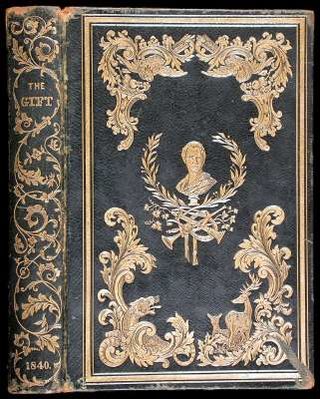
"William Wilson" is a short story by American writer Edgar Allan Poe, first published in 1839 in The Gift, with a setting inspired by Poe's formative years on the outskirts of London. The tale features a doppelgänger. It also appeared in the 1840 collection Tales of the Grotesque and Arabesque, and has been adapted several times.
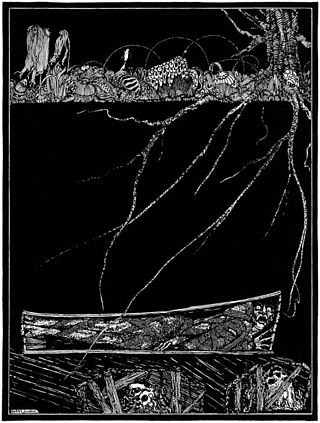
"The Premature Burial" is a horror short story by American writer Edgar Allan Poe, published in 1844 in The Philadelphia Dollar Newspaper. Its main character expresses concern about being buried alive. This fear was common in this period and Poe was taking advantage of the public interest. The story has been adapted to a film.
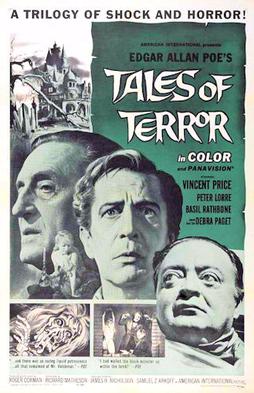
Tales of Terror is a 1962 American International Pictures comedy horror film in colour and Panavision, produced by Samuel Z. Arkoff, James H. Nicholson, and Roger Corman, who also directed. The screenplay was written by Richard Matheson, and the film stars Vincent Price, Peter Lorre, and Basil Rathbone. It is the fourth in the so-called Corman-Poe cycle of eight films, largely featuring adaptations of Edgar Allan Poe stories and directed by Corman for AIP. The film was released in 1962 as a double feature with Panic in Year Zero!.
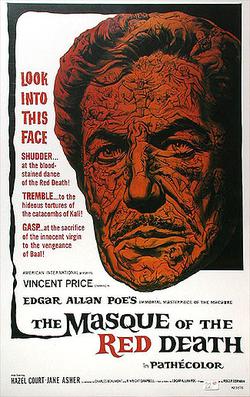
The Masque of the Red Death is a 1964 horror film directed by Roger Corman and starring Vincent Price. The story follows a prince who terrorizes a plague-ridden peasantry while merrymaking in a lonely castle with his jaded courtiers. The screenplay, written by Charles Beaumont and R. Wright Campbell, was based upon the 1842 short story of the same name by American author Edgar Allan Poe, and incorporates a subplot based on another Poe tale, "Hop-Frog". Another subplot is drawn from Torture by Hope by Auguste Villiers de l'Isle-Adam.

Murders in the Rue Morgue is a 1932 American horror film directed by Robert Florey, based on Edgar Allan Poe's 1841 short story "The Murders in the Rue Morgue". The plot is about Doctor Mirakle, a carnival sideshow entertainer and scientist who kidnaps Parisian women to mix their blood with that of his gorilla, Erik. As his experiments fail because of the quality of his victims' blood, Mirakle meets with Camille L'Espanye, and has her kidnapped and her mother murdered, leading to suspicion falling on Camille's fiance, Pierre Dupin, a medical student who has already become interested in the earlier murders.
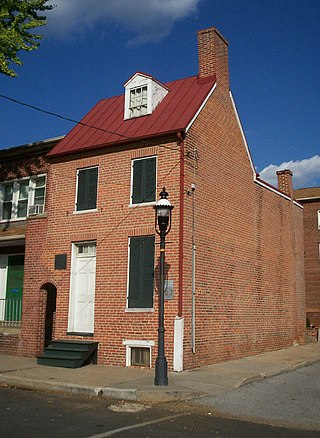
The Edgar Allan Poe House and Museum, located at 203 North Amity St. in Baltimore, Maryland, is the former home of American writer Edgar Allan Poe in the 1830s. The small unassuming structure, which was opened as a writer's house museum in 1949, is a typical row home. It was designated a National Historic Landmark in 1972.

American poet and short story writer Edgar Allan Poe has had significant influence in television and film. Many are adaptations of Poe's work, others merely reference it.

Edgar Allan Poe has appeared in popular culture as a character in books, comics, film, and other media. Besides his works, the legend of Poe himself has fascinated people for generations. His appearances in popular culture often envision him as a sort of "mad genius" or "tormented artist", exploiting his personal struggles. Many depictions of Poe interweave elements of his life with his works, in part due to Poe's frequent use of first-person narrators, suggesting an erroneous assumption that Poe and his characters are identical.

The Tell-Tale Heart is a 1960 British horror film directed by Ernest Morris produced by the Danzigers. The screenplay by Brian Clemens and Eldon Howard is a loose adaptation of the 1843 short story of the same name by Edgar Allan Poe. The film was released in England in December 1960, and in the U.S. in February 1962 as The Hidden Room of 1,000 Horrors.
The Tell-Tale Heart is an 1843 short story by Edgar Allan Poe.
Twixt is a 2011 American horror film written, produced, and directed by Francis Ford Coppola. It stars Val Kilmer, Bruce Dern, Elle Fanning, Ben Chaplin, Alden Ehrenreich, David Paymer, Joanne Whalley and Tom Waits. The film follows a struggling novelist (Kilmer) who stumbles upon a murder mystery in a small town, in the process entering an alternative, dream world. The film's title refers to the two worlds explored in the film, the dream and the waking worlds.
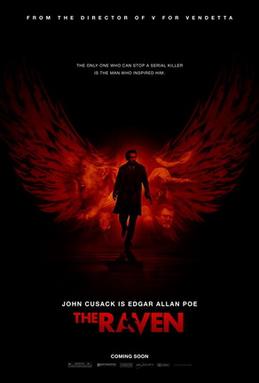
The Raven is a 2012 American crime thriller film directed by James McTeigue, produced by Marc D. Evans, Trevor Macy and Aaron Ryder and written by Ben Livingston and Hannah Shakespeare. Set in 1849, it is a fictionalized account detailing the last days of Edgar Allan Poe's life, in which the poet and author helps the police pursue a serial killer, whose murders mirror those in his stories. While the plot of the film is fictional, the writers based it on some accounts of real situations surrounding Edgar Allan Poe's mysterious death. Poe is said to have repeatedly called out the name "Reynolds" on the night before his death, though it is unclear to whom he was referring. The film stars John Cusack, Alice Eve, Brendan Gleeson and Luke Evans. Its title derives from Poe's 1845 poem "The Raven", in a similar manner to the earlier unrelated 1935 and 1963 films.

Tales of Poe is a 2014 anthology film directed by independent filmmakers Bart Mastronardi and Alan Rowe Kelly. As of February 2019, the film has grossed over $5k from video sales.
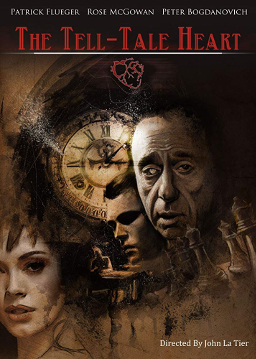
The Tell-Tale Heart is a 2014 horror film directed by John La Tier, based on Edgar Allan Poe's 1843 short story of the same name.
References
- ↑ "The Tell-tale Heart (1953)". Archived from the original on 12 September 2017.
- ↑ Malvern, Jack (23 October 2018). "Edgar Allen Poe's horror classic The Tell‑Tale Heart back from the dead after attic clear‑out". The Times. Retrieved 25 October 2018.(subscription required)
- ↑ Loughrey, Clarisse (24 October 2018). "Long-lost film adaptation of Edgar Allan Poe story discovered in an attic" . The Independent. Archived from the original on 20 June 2022. Retrieved 25 October 2018.
- ↑ "Missing horror film found in attic". BBC News. 23 October 2018. Retrieved 25 October 2018.
- ↑ "Movie fan who bought film for £5 discovers it's a missing long-lost British horror classic".
- ↑ "Movie buff finds long-lost horror film in second hand shop". STV News.